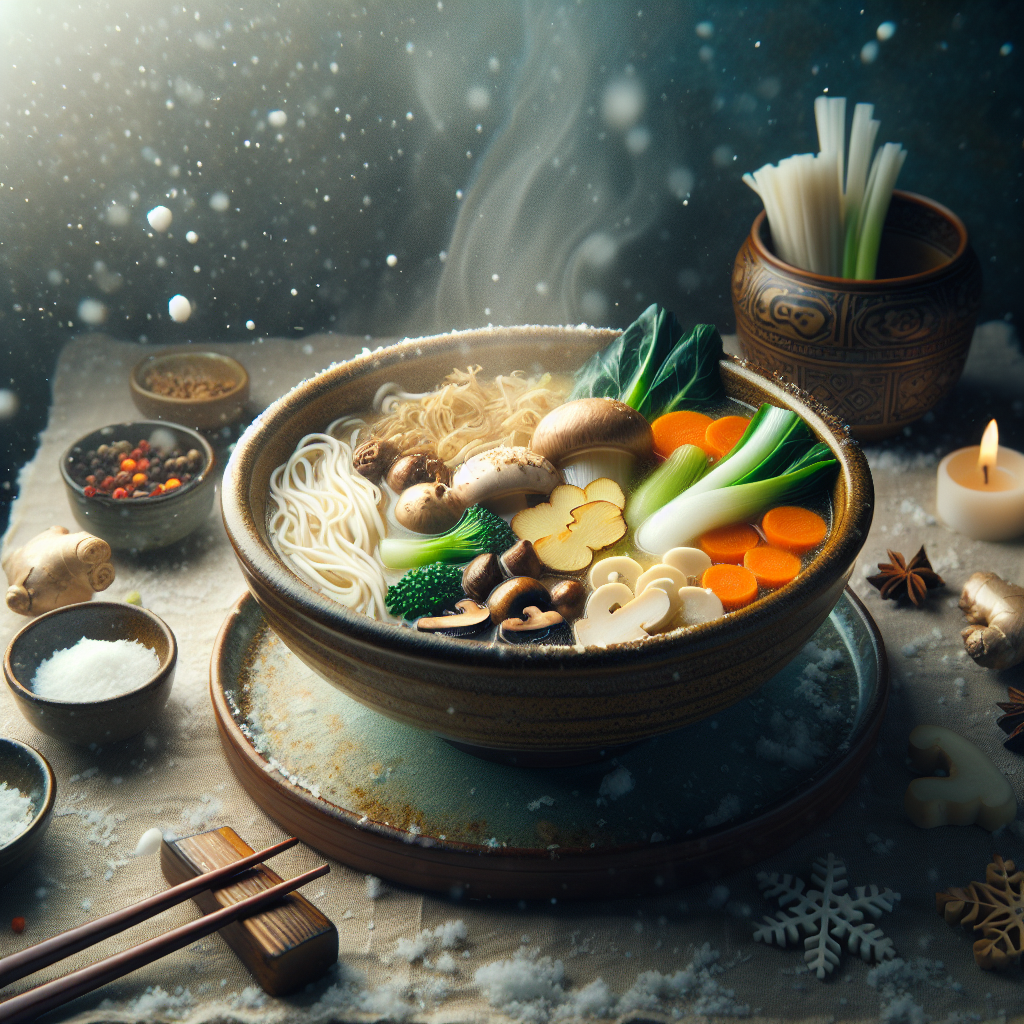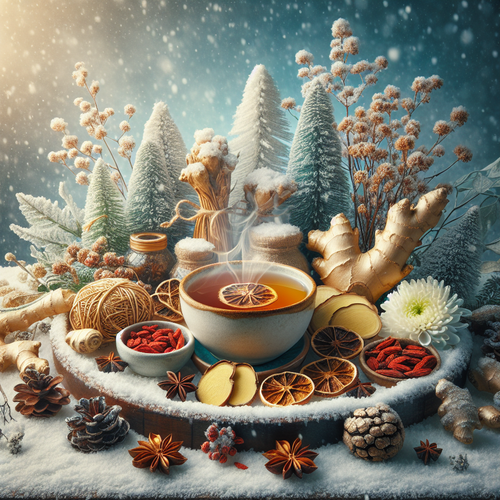Ancient Wisdom for Modern Winter Wellness
Posted by Sarah Johnson, M.S. in Holistic Healing on Oct 28th 2025
Ancient Wisdom for Modern Winter Wellness
As the cold months arrive, coughs, fatigue, and sluggishness often follow. Traditional Chinese Medicine (TCM) offers gentle yet powerful ways to keep the body strong and balanced through these changes.
For thousands of years, Chinese herbs have been used not just to fight illness — but to build resilience, support digestion, and keep inner warmth alive during the harshest season.
Unlike symptom-focused medicine, TCM views winter health through the lens of balance between Yin and Yang, strengthening what’s weak while dispersing excess cold.
 What Are the Best Chinese Herbs for Cold and Flu Season?
What Are the Best Chinese Herbs for Cold and Flu Season?
Winter illnesses often begin when the body’s defensive Qi is low.
Classic TCM formulas like Yin Qiao San remain favorites for early cold symptoms.
Key ingredients include:
-
Honeysuckle Flower (Jin Yin Hua) – helps the body clear heat and toxins
-
Forsythia Fruit (Lian Qiao) – supports the immune system and reduces inflammation
-
Mint (Bo He) – eases sore throat and nasal congestion
Try this: Brew 1 tsp of each in 2 cups of hot water. Sip warm throughout the day to soothe the throat and support recovery.
Did you know? Honeysuckle and forsythia are both supported by PubMed studies for their immune-modulating and antiviral potential.
How Can I Boost My Immunity Naturally During Winter?
When cold weather drains energy, herbs that tonify Qi (vital energy) and nourish the lungs are essential.
-
Astragalus Root (Huang Qi) – strengthens immune defenses and builds stamina
-
Codonopsis Root (Dang Shen) – supports digestion and lung energy
-
Reishi Mushroom (Ling Zhi) – improves immune resilience and calm focus
Incorporate easily: simmer astragalus in soups or add a slice of fresh ginger to morning tea. Many find consistent use helps them avoid mid-winter colds altogether.
“After two winters of astragalus soup, I haven’t caught a single cold,” shared one long-term customer of 1st Chinese Herbs.
 Chinese Herbal Soups and Teas That Keep You Warm
Chinese Herbal Soups and Teas That Keep You Warm
Astragalus + Codonopsis Soup
Ingredients:
-
2 tsp dried astragalus
-
1 tsp dried codonopsis
-
4 cups broth + carrots or mushrooms
Simmer for 40 minutes. This nourishing soup fortifies Qi and digestion — perfect for cold evenings.
Shop Astragalus & Codonopsis: 1st Chinese Herbs –
Winter Energy Bundle.
Ginger + Licorice Tea
-
1-inch sliced fresh ginger
-
1 tsp dried licorice root
-
3 cups water
Simmer 15 minutes. Strain and enjoy with honey for a throat-soothing, immune-warming tonic.
Which Chinese Herbs Warm the Body in Cold Weather?
According to TCM, cold constricts and slows the flow of Qi.
To counteract this, use warming herbs that restore circulation and digestive fire:
| Herb | Temperature | Primary Action | TCM Benefit |
|---|---|---|---|
| Ginger (Sheng Jiang) | Warm | Warms stomach, dispels cold | Aids digestion, boosts immunity |
| Cinnamon (Rou Gui) | Hot | Promotes circulation | Revives Yang energy |
| Jujube Dates (Hong Zao) | Neutral-Warm | Nourishes Qi, sweetens formulas | Strengthens spleen, calms spirit |
Add these to teas, porridges, or stews for both comfort and vitality.
How Do Chinese Herbs Help Balance Yin and Yang in Winter?
Winter is the season of Yin — dark, cold, inward energy. To prevent imbalance, we strengthen Yang using warming herbs and nourishing foods.
Try combining:
-
Goji Berries (Gou Qi Zi) – nourish Yin
-
Lamb or Chicken – support Yang
-
Ginger + Garlic – enhance warmth
These combinations create internal harmony, preventing the fatigue and mood dips often felt in late winter.
How to Use Chinese Herbs Safely and Effectively
Before beginning any herbal program, consult a qualified TCM practitioner.
They’ll consider your:
-
Health history & medications
-
Energy levels, digestion, and tongue appearance
-
Seasonal needs (e.g., dryness vs. dampness)
Dosage Tips:
| Form | Method | Duration |
|---|---|---|
| Tea | Steep 10–15 minutes | Daily prevention |
| Decoction | Simmer 30–45 minutes | For roots & tonics |
| Powder/Capsule | Follow label or practitioner | Convenience option |
Start small, stay consistent, and observe how your body responds.
Quality Assurance:
All herbs offered by 1st Chinese Herbs are lab-tested, GMP-certified, and ethically sourced.
Learn more → Our Quality Promise
Shop This Herb Collection
Enhance your winter wellness with authentic, bulk Chinese herbs:
Frequently Asked Questions
Q1: Can I take Chinese herbs daily during winter?
Yes, most tonic herbs like astragalus and codonopsis are safe for daily use when guided by a practitioner. Always start with small amounts.
Q2: What herbs are best for low energy and fatigue?
Astragalus, codonopsis, and reishi mushroom gently restore Qi and stamina over time.
Q3: Are Chinese herbs safe with medications?
Consult your healthcare provider before combining herbs with prescriptions. Herbs like licorice can interact with certain medications.
Q4: Can I use herbs preventively even when I’m not sick?
Absolutely — prevention is the core of TCM. Regular use of adaptogenic herbs strengthens immune resilience.
Final Thought
Chinese Herbs for Winter Health
This article explores how Traditional Chinese Medicine (TCM) uses specific herbs to strengthen the body, boost immunity, and promote balance during the cold winter months. It highlights key remedies such as ginger, licorice, astragalus, codonopsis, and reishi mushroom, explaining their roles in warming the body, easing cold and flu symptoms, and sustaining energy.
Readers learn about the philosophy of Yin and Yang, the importance of harmonizing body and environment, and practical ways to incorporate herbs through teas, soups, and decoctions. The article also provides safety guidance, dosage tips, and the importance of consulting a TCM practitioner for personalized care.
By blending ancient wisdom with modern wellness, the article shows how Chinese herbs offer a natural, preventive, and holistic approach to winter health, helping readers stay strong, warm, and balanced throughout the season.
Written by: Sarah Johnson, M.S. in Holistic Healing
Published on: October 28, 2025
References
-
Astragalus membranaceus (Huang Qi):
-
“The Effect of Astragalus on Humoral and Cellular Immune Response” — A meta-analysis of 19 human studies (1,094 participants) showing Astragalus significantly reduced pro-inflammatory cytokines (IL-2, IL-4, IL-6, IL-10, TNF-α, IFN-γ) and increased CD3 levels and the CD4/CD8 ratio. PubMed
-
“Astragalus membranaceus: A Review of its Protection Against Inflammation and Gastrointestinal Cancers” — Review of the herb’s immune-modulating mechanisms. PubMed+1
-
“A Review of the Pharmacological Action of Astragalus Polysaccharide” — Summarizes actions such as enhancing immune organ index, promoting immune-cell proliferation, stimulating cytokines and immunoglobulin secretion. PubMed+1
-
-
Zingiber officinale (Ginger):
-
“Hyperthermic Effect of Ginger Extract in Healthy Women with Cold Sensation” — A placebo-controlled crossover trial showing ginger produced measurable thermogenic (warming) effects in women who feel cold. PMC
-
“Ginger in Traditional Chinese Medicine: Review” — Discusses ginger’s classification as a “hot” herb in TCM and its effects on circulation, dispelling cold and promoting movement of energy (Qi). ScienceDirect+1
-
-
Other herbs / herbal medicine applications:
-
“Some Chinese Folk Prescriptions for Wind-Cold Type Common Cold” — Discusses use of warming herbs (ginger, honey, licorice) for wind-cold syndrome according to TCM. PMC
-
“Traditional Chinese Medicine Treatments for Upper Respiratory Tract Infections” — Review of TCM herbal therapies in URTIs, aligning with the idea of winter ailments and herbal support. PMC
-


